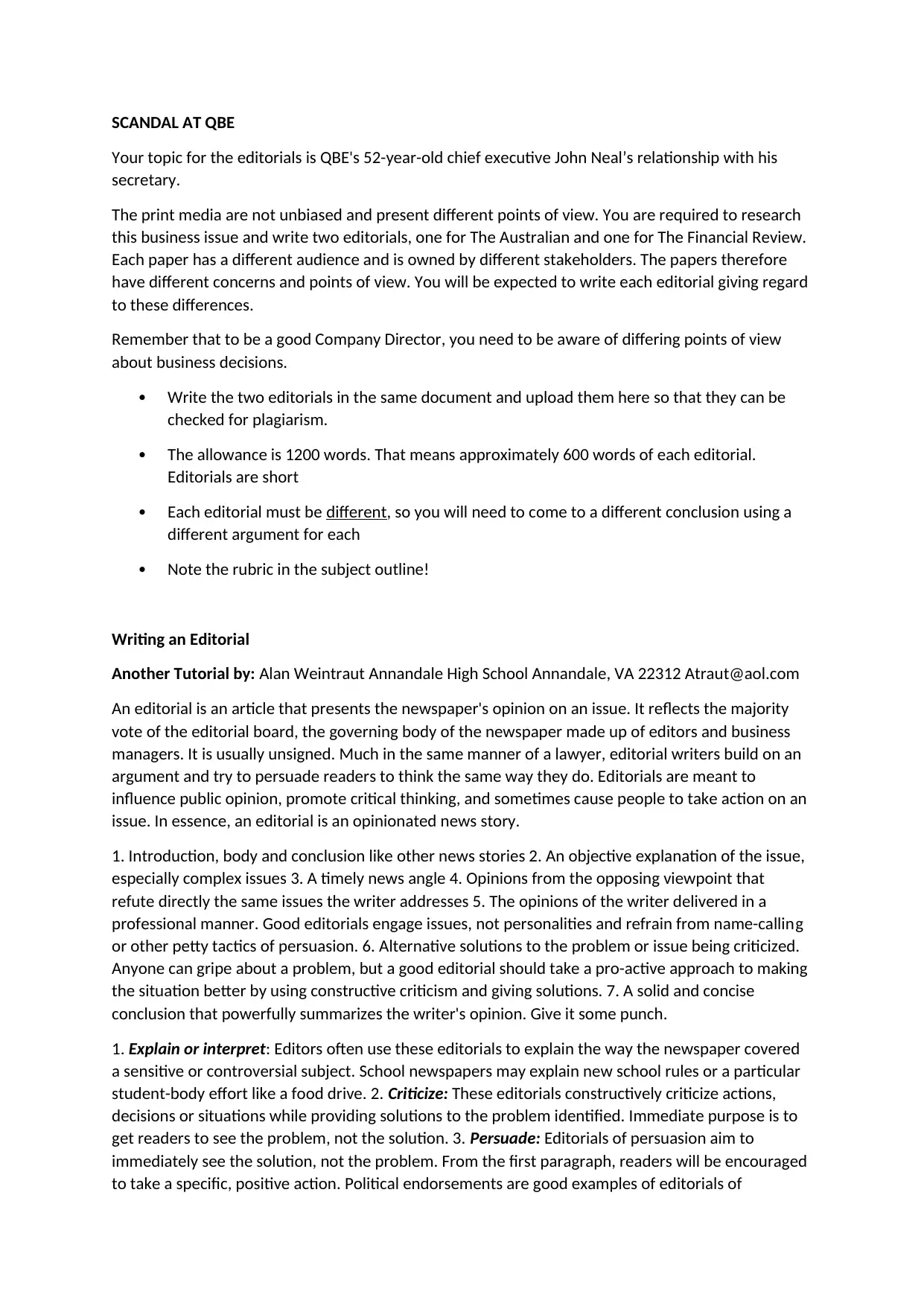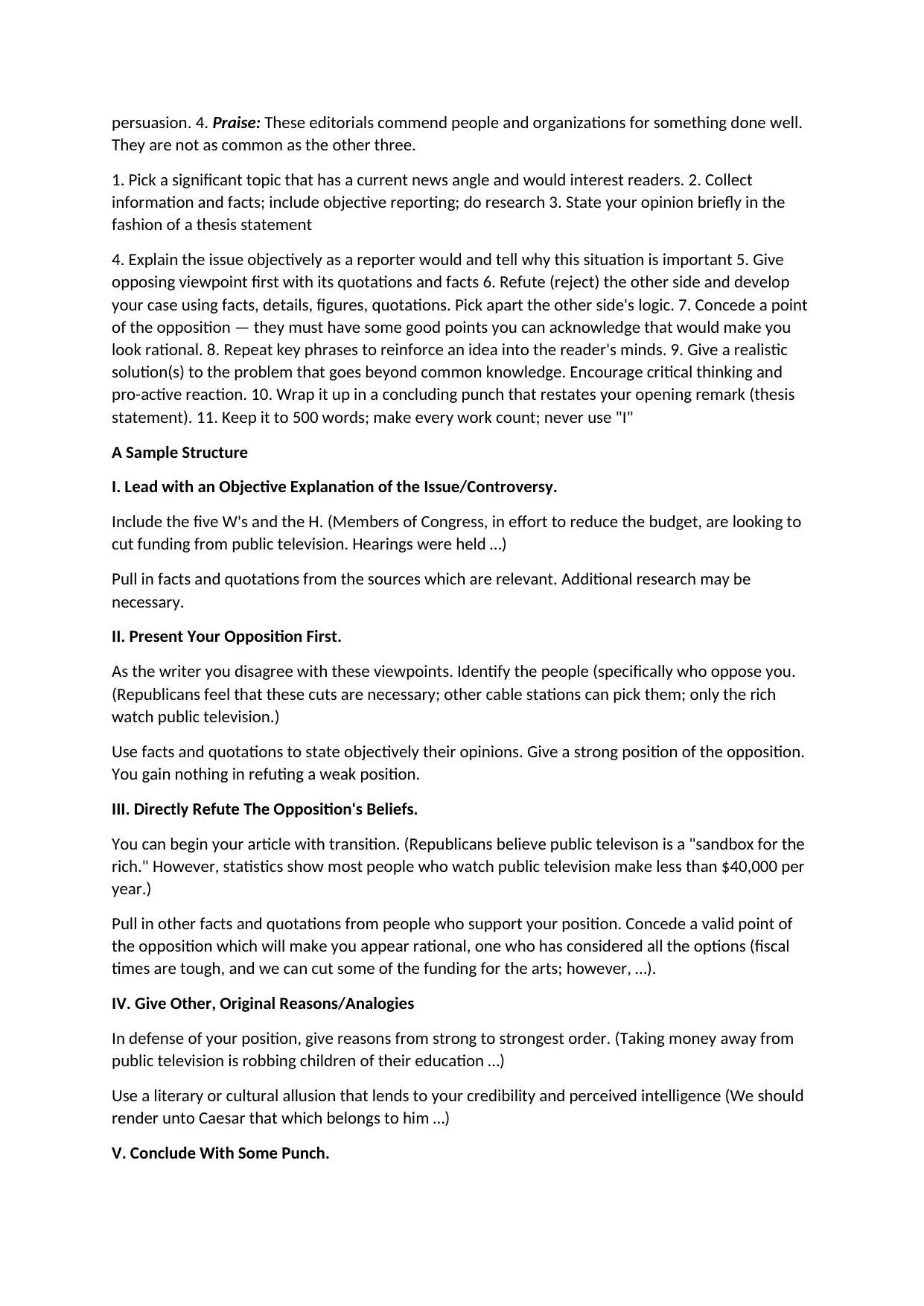QBE Scandal: Editorials for Different Audiences, Business Ethics
VerifiedAdded on 2019/09/30
|4
|1639
|169
Project
AI Summary
This assignment requires students to analyze the QBE scandal involving CEO John Neal's relationship with his secretary and write two distinct editorials, each approximately 600 words, for The Australian and The Financial Review. The editorials must reflect the different audiences, stakeholders, and viewpoints of each publication, demonstrating an understanding of business ethics and the importance of considering diverse perspectives in business decisions. Students are instructed to research the business issue and present arguments and conclusions tailored to each newspaper's readership, adhering to editorial writing principles such as presenting an objective explanation of the issue, incorporating opposing viewpoints, and offering solutions. The assignment emphasizes clear and fluent written communication, logic, and adherence to discipline-specific conventions, with assessment criteria focusing on effective communication, critical analysis, and appropriate presentation of complex business information.

SCANDAL AT QBE
Your topic for the editorials is QBE's 52-year-old chief executive John Neal’s relationship with his
secretary.
The print media are not unbiased and present different points of view. You are required to research
this business issue and write two editorials, one for The Australian and one for The Financial Review.
Each paper has a different audience and is owned by different stakeholders. The papers therefore
have different concerns and points of view. You will be expected to write each editorial giving regard
to these differences.
Remember that to be a good Company Director, you need to be aware of differing points of view
about business decisions.
Write the two editorials in the same document and upload them here so that they can be
checked for plagiarism.
The allowance is 1200 words. That means approximately 600 words of each editorial.
Editorials are short
Each editorial must be different, so you will need to come to a different conclusion using a
different argument for each
Note the rubric in the subject outline!
Writing an Editorial
Another Tutorial by: Alan Weintraut Annandale High School Annandale, VA 22312 Atraut@aol.com
An editorial is an article that presents the newspaper's opinion on an issue. It reflects the majority
vote of the editorial board, the governing body of the newspaper made up of editors and business
managers. It is usually unsigned. Much in the same manner of a lawyer, editorial writers build on an
argument and try to persuade readers to think the same way they do. Editorials are meant to
influence public opinion, promote critical thinking, and sometimes cause people to take action on an
issue. In essence, an editorial is an opinionated news story.
1. Introduction, body and conclusion like other news stories 2. An objective explanation of the issue,
especially complex issues 3. A timely news angle 4. Opinions from the opposing viewpoint that
refute directly the same issues the writer addresses 5. The opinions of the writer delivered in a
professional manner. Good editorials engage issues, not personalities and refrain from name-calling
or other petty tactics of persuasion. 6. Alternative solutions to the problem or issue being criticized.
Anyone can gripe about a problem, but a good editorial should take a pro-active approach to making
the situation better by using constructive criticism and giving solutions. 7. A solid and concise
conclusion that powerfully summarizes the writer's opinion. Give it some punch.
1. Explain or interpret: Editors often use these editorials to explain the way the newspaper covered
a sensitive or controversial subject. School newspapers may explain new school rules or a particular
student-body effort like a food drive. 2. Criticize: These editorials constructively criticize actions,
decisions or situations while providing solutions to the problem identified. Immediate purpose is to
get readers to see the problem, not the solution. 3. Persuade: Editorials of persuasion aim to
immediately see the solution, not the problem. From the first paragraph, readers will be encouraged
to take a specific, positive action. Political endorsements are good examples of editorials of
Your topic for the editorials is QBE's 52-year-old chief executive John Neal’s relationship with his
secretary.
The print media are not unbiased and present different points of view. You are required to research
this business issue and write two editorials, one for The Australian and one for The Financial Review.
Each paper has a different audience and is owned by different stakeholders. The papers therefore
have different concerns and points of view. You will be expected to write each editorial giving regard
to these differences.
Remember that to be a good Company Director, you need to be aware of differing points of view
about business decisions.
Write the two editorials in the same document and upload them here so that they can be
checked for plagiarism.
The allowance is 1200 words. That means approximately 600 words of each editorial.
Editorials are short
Each editorial must be different, so you will need to come to a different conclusion using a
different argument for each
Note the rubric in the subject outline!
Writing an Editorial
Another Tutorial by: Alan Weintraut Annandale High School Annandale, VA 22312 Atraut@aol.com
An editorial is an article that presents the newspaper's opinion on an issue. It reflects the majority
vote of the editorial board, the governing body of the newspaper made up of editors and business
managers. It is usually unsigned. Much in the same manner of a lawyer, editorial writers build on an
argument and try to persuade readers to think the same way they do. Editorials are meant to
influence public opinion, promote critical thinking, and sometimes cause people to take action on an
issue. In essence, an editorial is an opinionated news story.
1. Introduction, body and conclusion like other news stories 2. An objective explanation of the issue,
especially complex issues 3. A timely news angle 4. Opinions from the opposing viewpoint that
refute directly the same issues the writer addresses 5. The opinions of the writer delivered in a
professional manner. Good editorials engage issues, not personalities and refrain from name-calling
or other petty tactics of persuasion. 6. Alternative solutions to the problem or issue being criticized.
Anyone can gripe about a problem, but a good editorial should take a pro-active approach to making
the situation better by using constructive criticism and giving solutions. 7. A solid and concise
conclusion that powerfully summarizes the writer's opinion. Give it some punch.
1. Explain or interpret: Editors often use these editorials to explain the way the newspaper covered
a sensitive or controversial subject. School newspapers may explain new school rules or a particular
student-body effort like a food drive. 2. Criticize: These editorials constructively criticize actions,
decisions or situations while providing solutions to the problem identified. Immediate purpose is to
get readers to see the problem, not the solution. 3. Persuade: Editorials of persuasion aim to
immediately see the solution, not the problem. From the first paragraph, readers will be encouraged
to take a specific, positive action. Political endorsements are good examples of editorials of
Paraphrase This Document
Need a fresh take? Get an instant paraphrase of this document with our AI Paraphraser

persuasion. 4. Praise: These editorials commend people and organizations for something done well.
They are not as common as the other three.
1. Pick a significant topic that has a current news angle and would interest readers. 2. Collect
information and facts; include objective reporting; do research 3. State your opinion briefly in the
fashion of a thesis statement
4. Explain the issue objectively as a reporter would and tell why this situation is important 5. Give
opposing viewpoint first with its quotations and facts 6. Refute (reject) the other side and develop
your case using facts, details, figures, quotations. Pick apart the other side's logic. 7. Concede a point
of the opposition — they must have some good points you can acknowledge that would make you
look rational. 8. Repeat key phrases to reinforce an idea into the reader's minds. 9. Give a realistic
solution(s) to the problem that goes beyond common knowledge. Encourage critical thinking and
pro-active reaction. 10. Wrap it up in a concluding punch that restates your opening remark (thesis
statement). 11. Keep it to 500 words; make every work count; never use "I"
A Sample Structure
I. Lead with an Objective Explanation of the Issue/Controversy.
Include the five W's and the H. (Members of Congress, in effort to reduce the budget, are looking to
cut funding from public television. Hearings were held …)
Pull in facts and quotations from the sources which are relevant. Additional research may be
necessary.
II. Present Your Opposition First.
As the writer you disagree with these viewpoints. Identify the people (specifically who oppose you.
(Republicans feel that these cuts are necessary; other cable stations can pick them; only the rich
watch public television.)
Use facts and quotations to state objectively their opinions. Give a strong position of the opposition.
You gain nothing in refuting a weak position.
III. Directly Refute The Opposition's Beliefs.
You can begin your article with transition. (Republicans believe public televison is a "sandbox for the
rich." However, statistics show most people who watch public television make less than $40,000 per
year.)
Pull in other facts and quotations from people who support your position. Concede a valid point of
the opposition which will make you appear rational, one who has considered all the options (fiscal
times are tough, and we can cut some of the funding for the arts; however, …).
IV. Give Other, Original Reasons/Analogies
In defense of your position, give reasons from strong to strongest order. (Taking money away from
public television is robbing children of their education …)
Use a literary or cultural allusion that lends to your credibility and perceived intelligence (We should
render unto Caesar that which belongs to him …)
V. Conclude With Some Punch.
They are not as common as the other three.
1. Pick a significant topic that has a current news angle and would interest readers. 2. Collect
information and facts; include objective reporting; do research 3. State your opinion briefly in the
fashion of a thesis statement
4. Explain the issue objectively as a reporter would and tell why this situation is important 5. Give
opposing viewpoint first with its quotations and facts 6. Refute (reject) the other side and develop
your case using facts, details, figures, quotations. Pick apart the other side's logic. 7. Concede a point
of the opposition — they must have some good points you can acknowledge that would make you
look rational. 8. Repeat key phrases to reinforce an idea into the reader's minds. 9. Give a realistic
solution(s) to the problem that goes beyond common knowledge. Encourage critical thinking and
pro-active reaction. 10. Wrap it up in a concluding punch that restates your opening remark (thesis
statement). 11. Keep it to 500 words; make every work count; never use "I"
A Sample Structure
I. Lead with an Objective Explanation of the Issue/Controversy.
Include the five W's and the H. (Members of Congress, in effort to reduce the budget, are looking to
cut funding from public television. Hearings were held …)
Pull in facts and quotations from the sources which are relevant. Additional research may be
necessary.
II. Present Your Opposition First.
As the writer you disagree with these viewpoints. Identify the people (specifically who oppose you.
(Republicans feel that these cuts are necessary; other cable stations can pick them; only the rich
watch public television.)
Use facts and quotations to state objectively their opinions. Give a strong position of the opposition.
You gain nothing in refuting a weak position.
III. Directly Refute The Opposition's Beliefs.
You can begin your article with transition. (Republicans believe public televison is a "sandbox for the
rich." However, statistics show most people who watch public television make less than $40,000 per
year.)
Pull in other facts and quotations from people who support your position. Concede a valid point of
the opposition which will make you appear rational, one who has considered all the options (fiscal
times are tough, and we can cut some of the funding for the arts; however, …).
IV. Give Other, Original Reasons/Analogies
In defense of your position, give reasons from strong to strongest order. (Taking money away from
public television is robbing children of their education …)
Use a literary or cultural allusion that lends to your credibility and perceived intelligence (We should
render unto Caesar that which belongs to him …)
V. Conclude With Some Punch.

S4b Written Communication: Present complex business analyses and information appropriately to dif
audiences using clear and fluent written communication
Criteria Graduate certificate fail
(8)
Graduate certificate
pass (8)
fail (9)
Graduate certificate
exceeds (8)
pass (9)
P
C
ex
A
Use clear and fluent written
skills to effectively and
appropriately communicate
with an audience showing
focus, purpose and knowledge
of aims and objectives
Communication is unclear
with poor focus and purpose
showing little knowledge of
aims and objectives
Communication is clear with
some demonstration of
focus, purpose and
knowledge of aims and
objectives
Communication is clear
demonstrating sound focus,
purpose and intent
Communic
demonstrat
knowledge
and intent
B
Use clear and fluent written
skills to effectively and
appropriately communicate
with an audience demonstrating
logic, knowledge of context,
theory, application, critical
analyses and synthesis
Communication is unclear
with poor logic and context
knowledge and no evidence
of theory, application,
critical analysis and syn
Communication is clear with
some demonstration of logic
and context knowledge,
some evidence of theory and
application with minor
evidence of critical analysis
and synthesis
Communication is clear
demonstrating sound logic
and context knowledge,
robust evidence of theory and
application with clear
evidence of critical analysis
and synthesis
Communic
demonstrat
knowledge
and applica
analysis and
C
Use clear and fluent written
skills to effectively and
appropriately communicate
with an audience following a
range of discipline-specific
academic and/or professional
conventions
Communication is unclear
and fails to demonstrate any
discipline-specific academic
and/or professional
conventions
Communication is clear with
some demonstration of
discipline-specific academic
and/or professional
conventions
Communication is clear
demonstrating sound
adherence to discipline-
specific academic and/or
professional conventions
Communic
demonstrat
utilizing dis
academic a
convention
D
Use clear and fluent written
skills to effectively and
appropriately communicate
with an audience adhering to
fundamental syntax protocols,
spelling and punctuation
Communication is unclear
with poor syntax, spelling
and punctuation errors
Communication is clear with
some syntax, spelling and
punctuation errors
Communication is clear
demonstrating a sound
knowledge of writing
mechanics, i.e. syntax,
spelling and punctuation
errors
Communic
demonstrat
knowledge
writing mec
syntax, spe
punctuation
Give solutions to the problem or challenge the reader to be informed. (Congress should look to
where real wastes exist — perhaps in defense and entitlements — to find ways to save money.
Digging into public television's pocket hurts us all.)
A quotation can be effective, especially if from a respected source A rhetorical question can be an
effective concluder as well (If the government doesn't defend the interests of children, who will?) Go
to the library or any computer lab and complete the “webquest” located at
http://library.thinkquest.org/50084/index.shtml
http://library.thinkquest.org/50084/editorials/index.htm
audiences using clear and fluent written communication
Criteria Graduate certificate fail
(8)
Graduate certificate
pass (8)
fail (9)
Graduate certificate
exceeds (8)
pass (9)
P
C
ex
A
Use clear and fluent written
skills to effectively and
appropriately communicate
with an audience showing
focus, purpose and knowledge
of aims and objectives
Communication is unclear
with poor focus and purpose
showing little knowledge of
aims and objectives
Communication is clear with
some demonstration of
focus, purpose and
knowledge of aims and
objectives
Communication is clear
demonstrating sound focus,
purpose and intent
Communic
demonstrat
knowledge
and intent
B
Use clear and fluent written
skills to effectively and
appropriately communicate
with an audience demonstrating
logic, knowledge of context,
theory, application, critical
analyses and synthesis
Communication is unclear
with poor logic and context
knowledge and no evidence
of theory, application,
critical analysis and syn
Communication is clear with
some demonstration of logic
and context knowledge,
some evidence of theory and
application with minor
evidence of critical analysis
and synthesis
Communication is clear
demonstrating sound logic
and context knowledge,
robust evidence of theory and
application with clear
evidence of critical analysis
and synthesis
Communic
demonstrat
knowledge
and applica
analysis and
C
Use clear and fluent written
skills to effectively and
appropriately communicate
with an audience following a
range of discipline-specific
academic and/or professional
conventions
Communication is unclear
and fails to demonstrate any
discipline-specific academic
and/or professional
conventions
Communication is clear with
some demonstration of
discipline-specific academic
and/or professional
conventions
Communication is clear
demonstrating sound
adherence to discipline-
specific academic and/or
professional conventions
Communic
demonstrat
utilizing dis
academic a
convention
D
Use clear and fluent written
skills to effectively and
appropriately communicate
with an audience adhering to
fundamental syntax protocols,
spelling and punctuation
Communication is unclear
with poor syntax, spelling
and punctuation errors
Communication is clear with
some syntax, spelling and
punctuation errors
Communication is clear
demonstrating a sound
knowledge of writing
mechanics, i.e. syntax,
spelling and punctuation
errors
Communic
demonstrat
knowledge
writing mec
syntax, spe
punctuation
Give solutions to the problem or challenge the reader to be informed. (Congress should look to
where real wastes exist — perhaps in defense and entitlements — to find ways to save money.
Digging into public television's pocket hurts us all.)
A quotation can be effective, especially if from a respected source A rhetorical question can be an
effective concluder as well (If the government doesn't defend the interests of children, who will?) Go
to the library or any computer lab and complete the “webquest” located at
http://library.thinkquest.org/50084/index.shtml
http://library.thinkquest.org/50084/editorials/index.htm
⊘ This is a preview!⊘
Do you want full access?
Subscribe today to unlock all pages.

Trusted by 1+ million students worldwide

1 out of 4
Related Documents
Your All-in-One AI-Powered Toolkit for Academic Success.
+13062052269
info@desklib.com
Available 24*7 on WhatsApp / Email
![[object Object]](/_next/static/media/star-bottom.7253800d.svg)
Unlock your academic potential
Copyright © 2020–2026 A2Z Services. All Rights Reserved. Developed and managed by ZUCOL.



